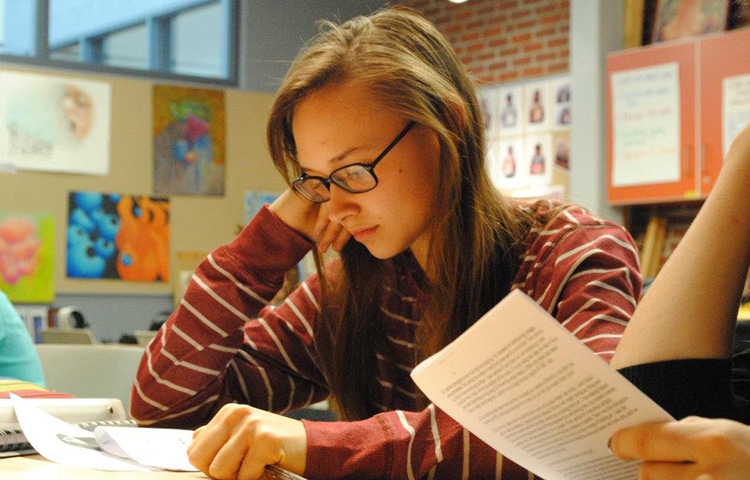Today’s student spotlight features current WRD major Emily Power. This past summer, Emily received a Summer Undergraduate Research Grant from DePaul’s College of Liberal Arts & Sciences to work on a reading project connected to her interest in TESOL. Below, she tells about her research experience and discusses how the WRD program influenced her research process.
Give us a brief overview of the project you were working on.
I was working on a research project in which I explored different opinions on the spread of English. The four research questions I asked as I went into the project were as follows:
What does it mean to teach English in the United States to speakers of other languages? How is this different from traveling to other countries to teach English (often without learning the students’ language(s)? 2. Do people feel like learning English is a choice? How does English affect the academic and professional success of people around the world? 3. By teaching English to speakers of other languages, would I be helping them achieve access to academic and professional success? 4. To what extent is the above a valid point, and to what extent am I still perpetuating a globalized English?
I read a variety of articles, chapters, and a few books to complete a paper that begins to answer these questions.
When working on your summer research grant project, what was a typical day “on the job” for you?
I had asked Professor Jason Schneider to be my mentor. He and I worked together to select articles, chapters, or books that spoke to one or more of my research questions. On a typical day, I would start by reading through one of these. I would take notes as I read so that I would remember which parts I found particularly engaging. Then, I would begin to write up a response to the article. In these responses I would try to summarize the articles’ main points, put them in conversation with the other readings I had done thus far, and discuss my personal responses to what I had read. From there, I would revise what I had written and reread some of the important parts of the article.
How did your education from DePaul influence your research?
I would not have become interested in the conversations about Teaching English as a Second Language had it not been for my education at DePaul. I took a class with Professor Jason Schneider called Global Englishes. In this class we learned about how English is becoming something of a lingua franca, and how many countries adopt English and use it in nuanced ways. It was also in this class that I was first introduced to opinions on the spread of English that demonstrated it was a more complex issue than I had originally understood. Class discussions tackled these issues; we talked about how learning English is not really a choice for many people and how it can make people feel like their own language, identity, and culture are being taken from them or are simply not respected and valued. These conversations are what prompted my interest in further researching opinions about the spread of English. At the time, I had also begun to be interested in earning my TESOL certificate at DePaul, and I thought that expanding my understanding and knowledge of these discussions would be important to the work I would do as an English Teacher down the road—if I felt that that was the right choice after my research.
What were the most helpful skills from WRD courses that you saw being implemented in your project?
One of the most useful skills I have learned and continue to develop through WRD courses is critical thinking. Because I was becoming interested in TESOL, I felt that it was my responsibility to take the time to think through issues about English’s spread. I didn’t want to just jump into a field without more completely understanding the position that I would be assuming within it. WRD has also taught me to be a better reader and—go figure—a better writer. Thus, these skills were helpful as a read through each of the articles or books and wrote my responses. For some of my WRD classes I have worked with a genre of writing called SSRs, an acronym for summarize, synthesize, and respond. I mimicked this genre in the responses that I wrote on each of my readings. This genre of writing significantly helped me grasp the main points of my reading and understand how the articles related to each other. Thinking through my readings like this helped me come to more carefully thought through personal responses.
